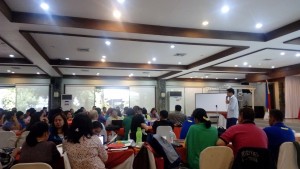
Cagayan de Oro City — The Department of Social Welfare and Development continues to develop and implement social protection programs to the poor, vulnerable and disadvantaged communities of Bukidnon, Camiguin, Lanao del Norte, Misamis Occidental and Misamis Oriental.
In 2015, through the collaborative efforts of the department, National Government Agencies, CSOs and other partner institutions, 36,000 more Pantawid Pamilya beneficiaries received livelihood assistance under the Sustainable Livelihood Program (SLP). From these beneficiaries, about 33,000 were trained and provided with capital assistance to establish their own businesses. Meanwhile another 3,000 trained with technical courses were directly referred to partner agencies for local and international employment.
According to Mr. Andrew Serrano, the Regional Program Coach Monitor, “the thrust and priorities for 2016 is to strengthen the existing micro-enterprises through constant mentoring and monitoring; and invest more on human capital through capability building while ensuring their employment as well”.
This year, the program further aims to offer a more sustainable livelihood projects and opportunities to 20,000 poor households. Special projects like Buttom-Up Budgeting (BuB) will carry on, taking into consideration the development needs of poor municipalities as identified in their respective Local Poverty Reduction Action Plan formulated with strong participation of civil society organizations.
Moreover, the program also adheres to issues on natural calamities such as the “El Niño”, which severely affected the local farmers of the region. About 15,000 farmers shall be given livelihood assistance to cover their investments and gain their losses.
The SLP is a multi-stakeholder program of the department that aims to improve the standard of living of poor households by facilitating opportunities for development and management of resources viable for micro-enterprises, community empowerment through skills trainings and employment facilitation. It gives significant priority to the Pantawid Pamilya beneficiaries in all its interventions since they are considered to be the poorest of the poor as signified by the National Household Targeting System for Poverty Reduction (NHTS-PR).
Written by Jamila M. Taha, DSWD


